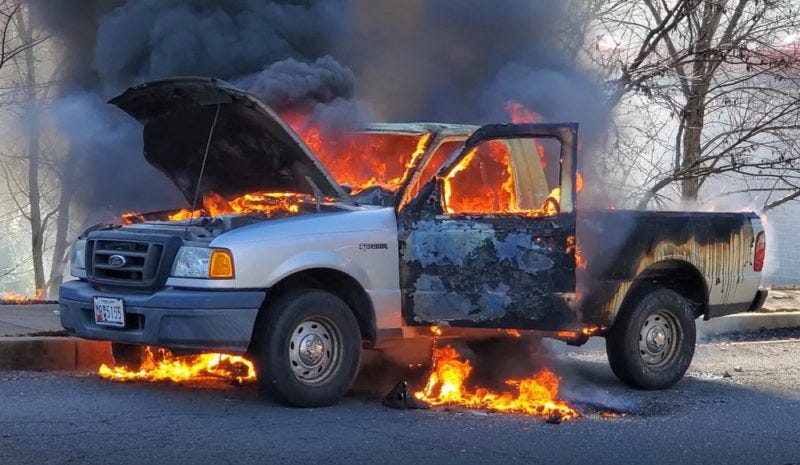Tesla fires!
Shriek the headlines. But it's fake hype.
How can I justify a story about Tesla cars here at UV & You, you may ask?
I guess I could point to the tinted glass roofs. You might be concerned that they would transmit harmful UV rays. No, you don’t need to worry on that score. Even ordinary untinted window glass transmits only a tiny fraction of the harmful UVB wavelengths that cause skin cancer (or that produce vitamin D in your skin for that matter).
I do sometimes overflow into climate change issues. This is one of those.
Having an electric car instead of a gas-guzzler certainly helps avert climate change. ‘Certainly?’, you question. What about this and that, you might ask (but probably not if you subscribe to UV & You)? The this’s and that’s are common questions raised by people who don’t want electric cars to succeed. People who’ve been subconsciously seduced by agents of the oil industry. There’s a good website here that rebuts ten such criticisms.
The myth I want to talk about here is, Myth 9: EVs catch fire a lot. As a Tesla owner for the last 18 months, I hear plenty of comments like “I saw a Tesla on fire the other day near …. The flames were …”. The people who pass on these tit-bits invariably seem to take some sort of delight in passing on the news, as if they want to tell me the folly of my ways. But there’s no chance that I’ll revert to a petrol car.
Because there’s so much misinformation out there on this, an info site publishes details of all Tesla fires. The last listed occurred in October 2023. Presuming the site is up-to-date, there have been 218 fires in total (and 80 deaths). It does seem rather a large number - until you realise how many Teslas are out there. Worldwide, 1.8 million of them were sold in 2023 alone. So far, over 17,000 are on the road in New Zealand, and according to the web site, only one has been involved in a fire - when it crashed on a bridge. There were no fatalities. My friend who “saw a Tesla on Fire” must have been watching a You Tube clip because that singular event was in Auckland, about 1500 kilometres north of where he lives.
What’s interesting to me is how few fires involve pure electric cars. The risk is tiny compared with conventional cars, as shown by the statistics quoted from an insurance company in the USA.
Hybrid vehicles: 3,474 fires per 100,000 sales
Petrol vehicles : 1,529 fires per 100,000 sales
Electric vehicles: 25 fires per 100,000 sales
More statistics …
According to the USA’s National Fire Protection Association, the national average for vehicle fires is about one fire per 19 million miles travelled. But for Teslas, it's way less frequent. From 2012 to 2020, there was about one Tesla fire for every 205 million miles travelled.
If you’re buying a car based on fire risk alone – you should definitely buy an EV! While fires in EVs may be harder to extinguish, they’re also slower to take hold.
It’s interesting that the risk for hybrids is about twice as large as for petrol cars. I guess that’s partly because they duplicate both technologies. But the risk for pure electrics - like all Tesla cars - is less than 0.5 percent of that for petrol cars.
We shouldn’t be too surprised that the fire risk is so much lower for EVs. Petrol is highly combustible. Much more so than anything in an electric car. If I drop a lighted match anywhere near my electric car, no damage will be done. But I wouldn’t want to try dropping one into the fuel tank of a petrol car.
I won’t bore you with the other 9 myths, or the answers to them. You can look them up yourself here.
A final thought. In an internal combustion engine car, a small fire is ignited for every stroke of the piston. Typically about eight thousand of them every minute. That’s their main problem. A primitive exhaust system is needed to discharge the waste, including greenhouse gases, through the tailpipe into the atmosphere. And, because most of the energy is also wasted, a dedicated cooling system is needed to get rid of it. Not to mention the need for a gearbox because the efficiency/wastage from these motors is so dependent on engine revs. Contrast that with an EV.
Please share with your petrol-head friends.
My apologies for this being more about EV & Me, rather than UV & You. 😊


Yay. I can understand it.